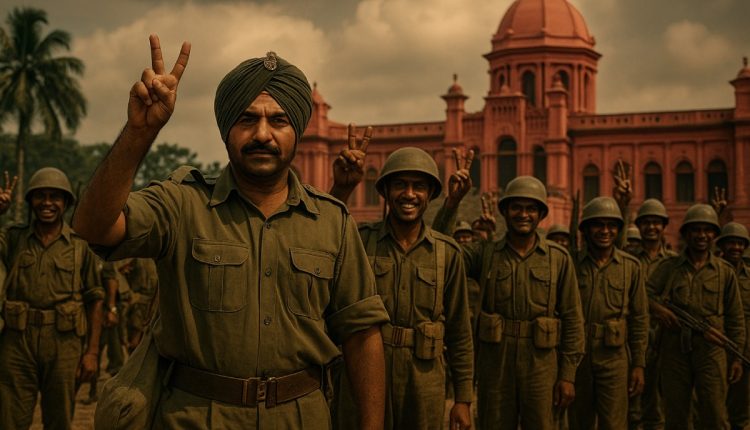The 1971 India-Pakistan War stands as a defining moment in South Asian history—a war that didn’t just end in a military triumph, but in the birth of a new nation: Bangladesh. Fought over just 13 days, it remains one of the shortest yet most decisive wars in modern military history. The conflict reshaped the geopolitical landscape of the subcontinent and highlighted India’s role as a regional power.
Background: Why the War Happened
Political Tensions in East Pakistan
-
Pakistan was divided geographically into West Pakistan (present-day Pakistan) and East Pakistan (present-day Bangladesh), separated by 1,600 km of Indian territory.
-
East Pakistanis, despite forming the majority of Pakistan’s population, were politically and economically marginalized.
-
The 1970 general elections saw Sheikh Mujibur Rahman’s Awami League win a majority. However, the ruling West Pakistani elite refused to transfer power.
Operation Searchlight
-
On March 25, 1971, the Pakistani Army launched Operation Searchlight to suppress Bengali autonomy.
-
Resulted in mass killings, rape, and a humanitarian crisis, with an estimated 3 million deaths and 10 million refugees fleeing to India.
India’s Involvement
Initially, India maintained diplomatic pressure and provided shelter to millions of refugees in West Bengal, Assam, and Tripura. But when cross-border tensions escalated and Pakistan attacked Indian airbases on December 3, 1971, India formally entered the war.
Operation Cactus Lily
-
India launched a two-front war in the western and eastern sectors.
-
Eastern Command, led by Lt. Gen. Jagjit Singh Aurora, quickly advanced into East Pakistan.
Blitzkrieg-Style Victory
-
In just 13 days, Indian forces surrounded Dhaka.
-
Pakistan’s Lt. Gen. A.A.K. Niazi surrendered on December 16, 1971 with over 93,000 soldiers—the largest military surrender since World War II.
Outcome: Creation of Bangladesh
-
Bangladesh was declared an independent nation on December 16, 1971.
-
India recognized Bangladesh’s independence immediately and played a pivotal role in establishing its first government.
-
The war was seen as a humanitarian intervention by many, although it also carried deep strategic and political motivations.
Key Leaders & Heroes
India:
-
Indira Gandhi – Prime Minister of India, known for her strong diplomatic and military leadership.
-
Field Marshal Sam Manekshaw – Architect of India’s swift military strategy.
-
Lt. Gen. Jagjit Singh Aurora – Commanded the Eastern Front.
-
Arjan Singh (Air Chief Marshal) – Led crucial IAF operations.
Bangladesh:
-
Sheikh Mujibur Rahman – Father of the Nation, founder of Bangladesh.
-
Muktibahini – Bengali freedom fighters trained and supported by India.
International Reaction
-
The war strained India’s relations with the United States, which supported Pakistan under President Nixon.
-
The Soviet Union supported India, providing crucial diplomatic and military backing through the Indo-Soviet Treaty of Peace and Friendship (1971).
-
The UN eventually stepped in, but the war was already won by the time diplomacy resumed.
Legacy of the 1971 War
For India:
-
Cemented India’s role as a regional superpower.
-
Boosted national morale and military confidence.
-
Exposed the limitations of Cold War alliances.
For Bangladesh:
-
Emerged as a sovereign, secular, and democratic nation.
-
Gained global recognition and started its journey toward rebuilding.
For Pakistan:
-
Deep humiliation and loss of East Pakistan.
-
Triggered political upheaval and the eventual downfall of President Yahya Khan.
-
Led to the rise of Zulfikar Ali Bhutto as Pakistan’s new leader.
Victory Day Observances
-
India celebrates Vijay Diwas on December 16 every year to mark the victory.
-
Bangladesh observes Bijoy Dibosh on the same day to honor its liberation.
“We have won a great military victory, but we have yet to win the battle for peace.”
— Indira Gandhi, 1971
Conclusion: A Turning Point in South Asian History
The 1971 War was not just a military conflict—it was a humanitarian stand, a political statement, and a strategic masterstroke. It demonstrated the power of international diplomacy, regional alliances, and moral leadership. Above all, it gave rise to a new nation born from struggle and sacrifice.


Comments are closed.